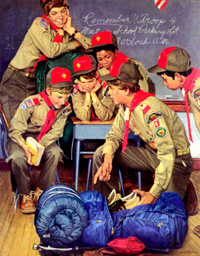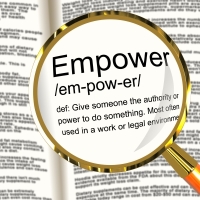 Our older son, a second-year medical student, came over and joined us for lunch this weekend. He filled us in on some of what the school is planning for next year’s incoming class. For the past year, he has been the volunteer leader of a co-curricular study program called Case-Based Learning, in which second-year students mentor first-years in situational learning. They work in small groups, posing hypothetical situations appropriate to what they’ve been covering in lecture, with the first-year students mulling over the problem and coming up with a solution collaboratively. After being impressed with its success, the dean of the medical school met with my son to talk about how this independent study concept could be incorporated into the actual curriculum. He told us that, starting next year, many of the large lecture classes (which can include a couple hundred students) are going to be replaced with smaller study groups, where students will take turns learning specific skills or elements and then teach them to the rest of the students in their small group. The concept is that by teaching a new skill themselves, students will learn it better than if they’ve just heard someone lecturing them about it and retaining it just long enough to repeat it back on an exam.
Our older son, a second-year medical student, came over and joined us for lunch this weekend. He filled us in on some of what the school is planning for next year’s incoming class. For the past year, he has been the volunteer leader of a co-curricular study program called Case-Based Learning, in which second-year students mentor first-years in situational learning. They work in small groups, posing hypothetical situations appropriate to what they’ve been covering in lecture, with the first-year students mulling over the problem and coming up with a solution collaboratively. After being impressed with its success, the dean of the medical school met with my son to talk about how this independent study concept could be incorporated into the actual curriculum. He told us that, starting next year, many of the large lecture classes (which can include a couple hundred students) are going to be replaced with smaller study groups, where students will take turns learning specific skills or elements and then teach them to the rest of the students in their small group. The concept is that by teaching a new skill themselves, students will learn it better than if they’ve just heard someone lecturing them about it and retaining it just long enough to repeat it back on an exam.
My first reaction was to observe that it sounds pretty much like the patrol method at work. Continue reading “The way Scouts learn”
 A Scout is Helpful. It’s right there in the Scout Law. Number three. A Scout cares about other people. He willingly volunteers to help others without expecting a reward.
A Scout is Helpful. It’s right there in the Scout Law. Number three. A Scout cares about other people. He willingly volunteers to help others without expecting a reward.

 As young people cross over from Cub Scouts to ScoutsBSA‘s programs, their parents frequently follow. Often, the more involved adults have been volunteer leaders in their childrens’ packs, and it is this source of talent that many troops seek to help do the many things that adults do for the Scouts.
As young people cross over from Cub Scouts to ScoutsBSA‘s programs, their parents frequently follow. Often, the more involved adults have been volunteer leaders in their childrens’ packs, and it is this source of talent that many troops seek to help do the many things that adults do for the Scouts.
 Our older son, a second-year medical student, came over and joined us for lunch this weekend. He filled us in on some of what the school is planning for next year’s incoming class. For the past year, he has been the volunteer leader of a co-curricular study program called Case-Based Learning, in which second-year students mentor first-years in situational learning. They work in small groups, posing hypothetical situations appropriate to what they’ve been covering in lecture, with the first-year students mulling over the problem and coming up with a solution collaboratively. After being impressed with its success, the dean of the medical school met with my son to talk about how this independent study concept could be incorporated into the actual curriculum. He told us that, starting next year, many of the large lecture classes (which can include a couple hundred students) are going to be replaced with smaller study groups, where students will take turns learning specific skills or elements and then teach them to the rest of the students in their small group. The concept is that by teaching a new skill themselves, students will learn it better than if they’ve just heard someone lecturing them about it and retaining it just long enough to repeat it back on an exam.
Our older son, a second-year medical student, came over and joined us for lunch this weekend. He filled us in on some of what the school is planning for next year’s incoming class. For the past year, he has been the volunteer leader of a co-curricular study program called Case-Based Learning, in which second-year students mentor first-years in situational learning. They work in small groups, posing hypothetical situations appropriate to what they’ve been covering in lecture, with the first-year students mulling over the problem and coming up with a solution collaboratively. After being impressed with its success, the dean of the medical school met with my son to talk about how this independent study concept could be incorporated into the actual curriculum. He told us that, starting next year, many of the large lecture classes (which can include a couple hundred students) are going to be replaced with smaller study groups, where students will take turns learning specific skills or elements and then teach them to the rest of the students in their small group. The concept is that by teaching a new skill themselves, students will learn it better than if they’ve just heard someone lecturing them about it and retaining it just long enough to repeat it back on an exam.